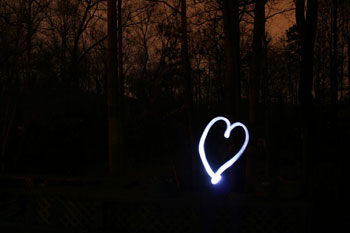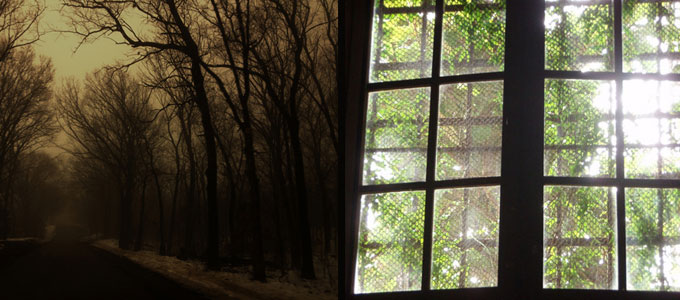by Meghan Aelabouni
In the fall of 2007, a published collection of Mother Teresa’s private letters revealed that this world-renowned servant of the poorest of the poor, candidate for sainthood in the Roman Catholic Church, suffered from intense spiritual doubts for much of her life.
Some Christians were aghast to think that Mother Teresa’s work wasn’t grounded in unwavering belief. Some atheists and agnostics were pleased, feeling vindicated—or at least better understood. Others argued that Mother Teresa’s dedication in the face of God’s apparent silence was actually a sign of strong faith. To quote St. Augustine: “God is closer to us than we are to ourselves.” And all over the world, there were people of faith who responded as I did—with a sigh of relief and recognition, feeling suddenly less alone in the world.
My faith/doubt story
I have no “lightning bolt” experience of coming to faith. Baptized as an infant and raised in the church, I have had faith for as long as I can remember. I went to Sunday school, sang in the church choir, and washed hundreds of tiny glass communion cups in a soapy sink with my mother. At church camps, I sang heartfelt songs of praise; and I prayed daily.
Yet, my prayers were almost always for more faith: to be free from doubt that had also been with me for as long as I could remember. I was the kid who asked why the dinosaurs were missing from the Bible and questioned the miracles of Jesus. At Christmas, as I sang “Silent Night,” I still couldn’t wrap my mind around the virgin birth.
And so, I prayed for the spiritual strength to get it together: to accept, to believe, to stop questioning. I was convinced that faith was an “all or nothing” proposition, and that doubt was a faith defect that must be corrected in order to achieve a flawless, wholehearted belief in God.
Gradually, I came to know better. Writer Anne Lamott has pointed out that the opposite of faith is not doubt, but certainty. What we know for certain requires no faith on our part. Faith, the “assurance of things hoped for and the conviction of things unseen,” requires not knowing. Human beings, using our reason and imagination, explore the parameters of what is unknown, question what is assumed, challenge what is taken for granted. So did I. So do many thoughtful people I know. Doubt is not a deficit, a lack of faith; it is an active process of questioning and searching for truth. Or, as Frederick Buechner puts it: “Doubt is the ants in the pants of faith.”
Head and heart
 Buechner writes of two kinds of doubt: “head” doubt and “heart” doubt. Head doubt is a primary tool of theology. How could Jesus be human and divine? How do we interpret the ancient texts of the Bible in a 21st century context? What about other religions? To address questions like these with integrity, we first have to admit the limits of what we know and understand. Doubt can provide us humility, the awareness that not all the answers are easy or even possible.
Buechner writes of two kinds of doubt: “head” doubt and “heart” doubt. Head doubt is a primary tool of theology. How could Jesus be human and divine? How do we interpret the ancient texts of the Bible in a 21st century context? What about other religions? To address questions like these with integrity, we first have to admit the limits of what we know and understand. Doubt can provide us humility, the awareness that not all the answers are easy or even possible.
Heart doubt, Buechner writes, is like Jesus’ cry on the cross: “My God, my God, why have you forsaken me?” We doubt ourselves, our feelings and judgment; we doubt others; we experience the “paralysis of analysis” as we second-guess everything. My heart doubt finds me when I lie awake at 2 a.m., doubting myself as a pastor, parent, spouse and friend. I doubt God, and worry that if God turns out to be fictional, I’ll have “lost” my life to faith without gaining anything true.
Heart doubt can be brutal; but it can also be essential to faith. Some things should be doubted. When tragedy and injustice break our hearts and lead us to cry out with Jesus, “My God, why have you forsaken us?” God may be stirring up doubt in us because we can be part of the solution. Doubt arising from the brokenness of the world may be the first step of a holy calling.
Good news from a doubting Luther
“I believe that I cannot by my own reason or strength believe in Jesus Christ my Lord, or come to Him,” Martin Luther professed in the Small Catechism. These words have brought freedom and hope into many of my doubtful nights. God’s love doesn’t depend on my ability to force the reason of my head and the strength of my heart past the questions. God doesn’t measure my faith by how many parts of the Bible I accept as literal fact. God doesn’t measure my faith at all! Faith is a gift of the Holy Spirit.
I have come to be thankful to the Holy Spirit not only for the gift of my faith, but also for the gift of my doubt. It has helped me to redefine faith not as absolute belief, but as trust: living as though God is real and God’s promises are true, without knowing for sure. Doubt helps to keep me humble, cautioning me against pat answers and false certainty. Today, one of the greatest joys in my ministry is proclaiming the good news that there is such a thing as faithful doubt! May you, too, find in your doubt a window to a deeper, richer, truer faith in the God who claims us—doubts and all.
Discussion Questions:
1. How might you reconcile Mother Teresa’s faithful ministry with her doubt in God’s existence?
2. What are some of your “head doubts” and “heart doubts”?
3. What are some of the ways doubt might help you to grow in faith?
Closing Prayer:
God of our heads and our hearts, remind us that you can work through our doubt to bring us new insight, understanding, and compassion for others. Guide us in faith, in doubt, and in trust, in the name of Jesus. Amen.
Meghan Johnston Aelabouni serves as co-pastor of Trinity Lutheran Church in Fort Collins, Co., with her spouse, Gabi Aelabouni. Baptized as a (screaming) infant in 1979, raised in the church, and ordained in 2007, she is a faithful doubter, mom of two small children, writer, and guest speaker.


I’m so thankful you openly addressed this topic. I have many doubts right now and often think of Christianity as all or nothing as well. It is nice to know I’m not alone and most of all doubt is okay. Thank you!
I too have wondered if I have “enough” faith. I prayed for many years to have the faith of Abraham, who was wiling to sacrifice his own son because God told him to do so. I prayed that God would not take my children from me or ask me to give them up. Then my youngest daughter answered the call to ministry, and all my nightmares about losing her stopped. God took her, but not in the way I had so long feared.
Thank you for this thoughtful and insightful article on faith and doubt. It was well written and gets to the “heart” of the matter of belief in the Gospel in our time. I most especially like the comparisons of “head” and “heart” faith/doubt. Most helpful meditation.
Thank you for the words of faith…I liked the idea of working through doubt to arrive at a deeper/richer faith .
It’s when I have done a sinful act that I have doubts, but your comments are reassuring that from those doubts I can believe that I am God’s creation and that God wants me to be His own. Shalom
Thank you so very much, Meghan, for putting into words what I have felt for decades. As a pastor myself, I may be quoting you often in the future!